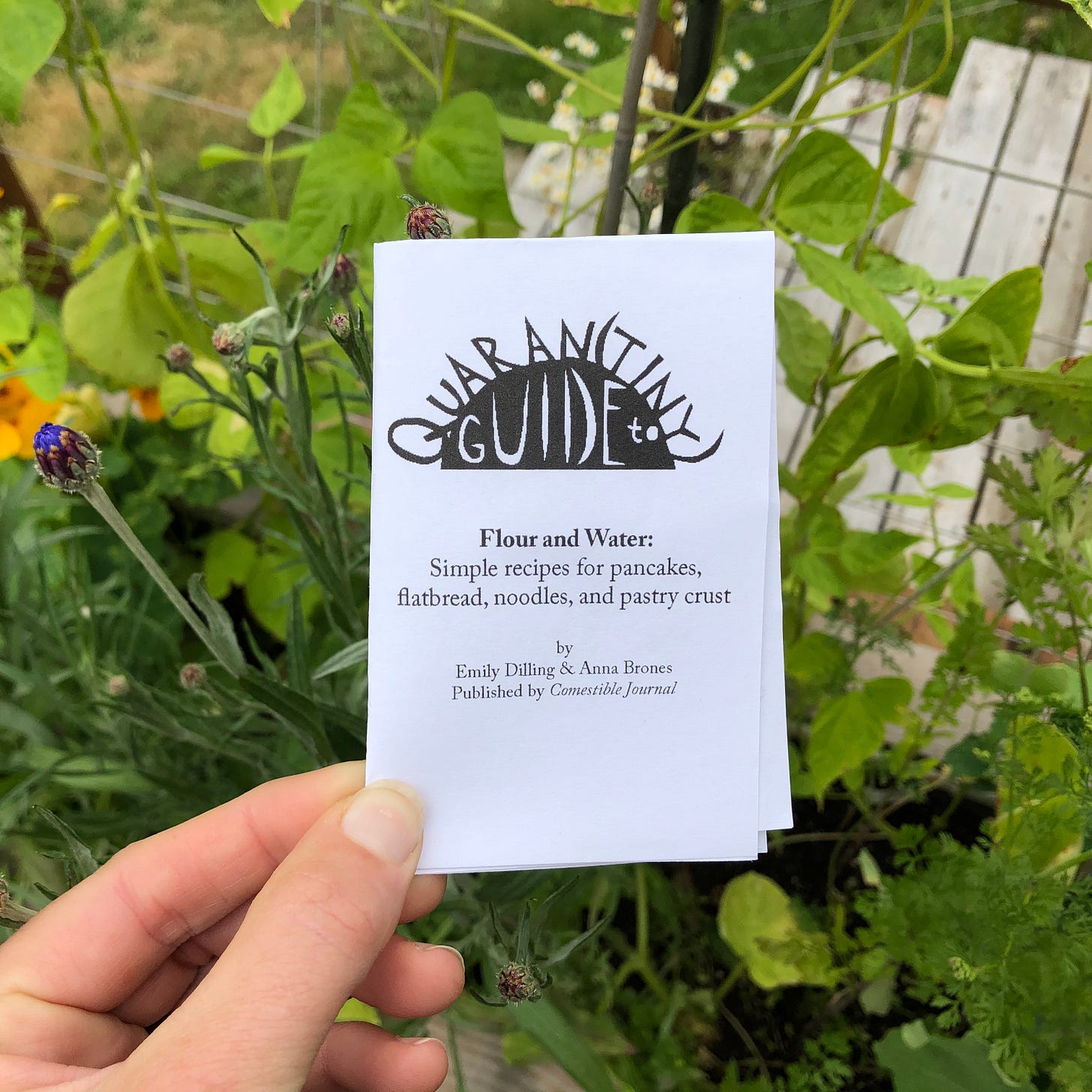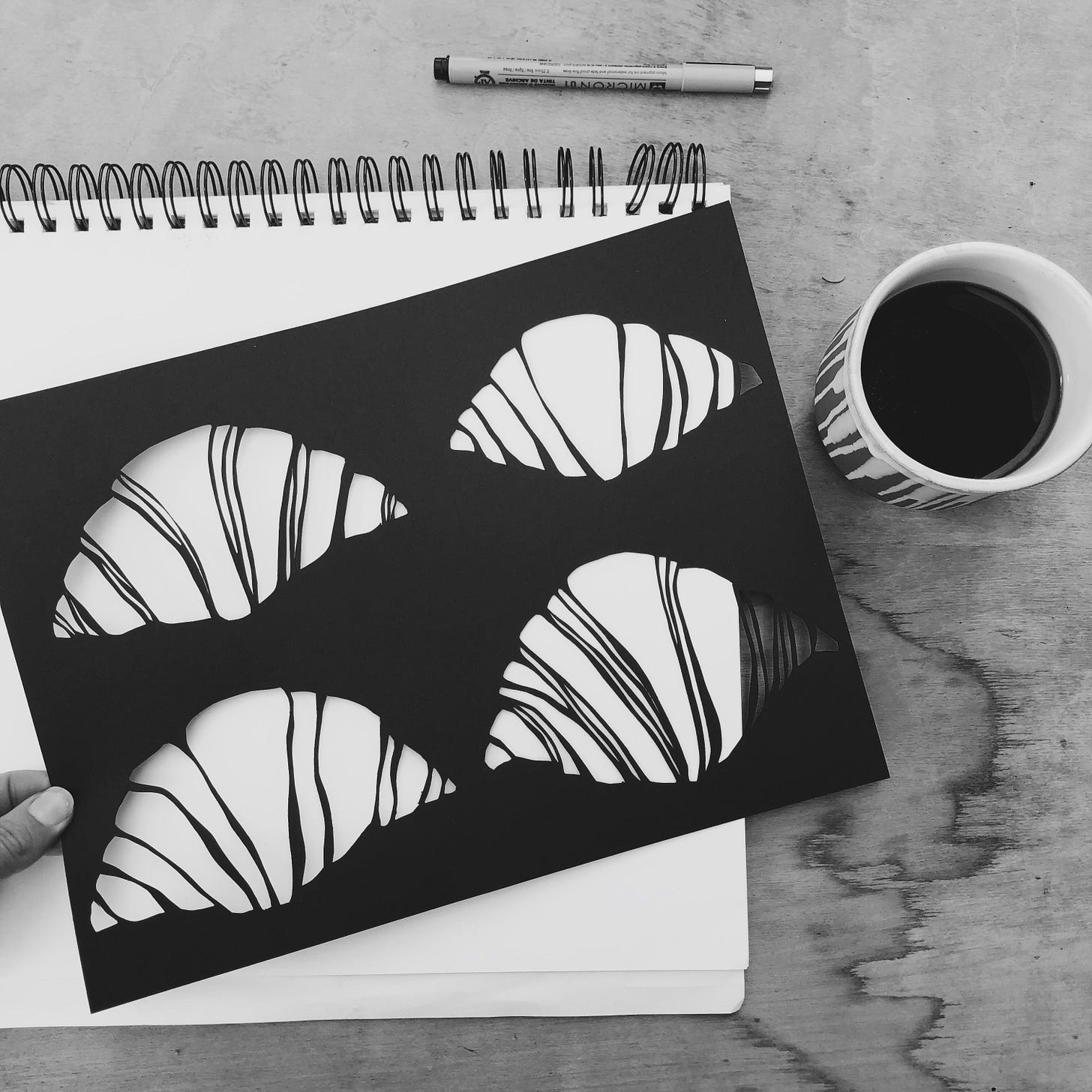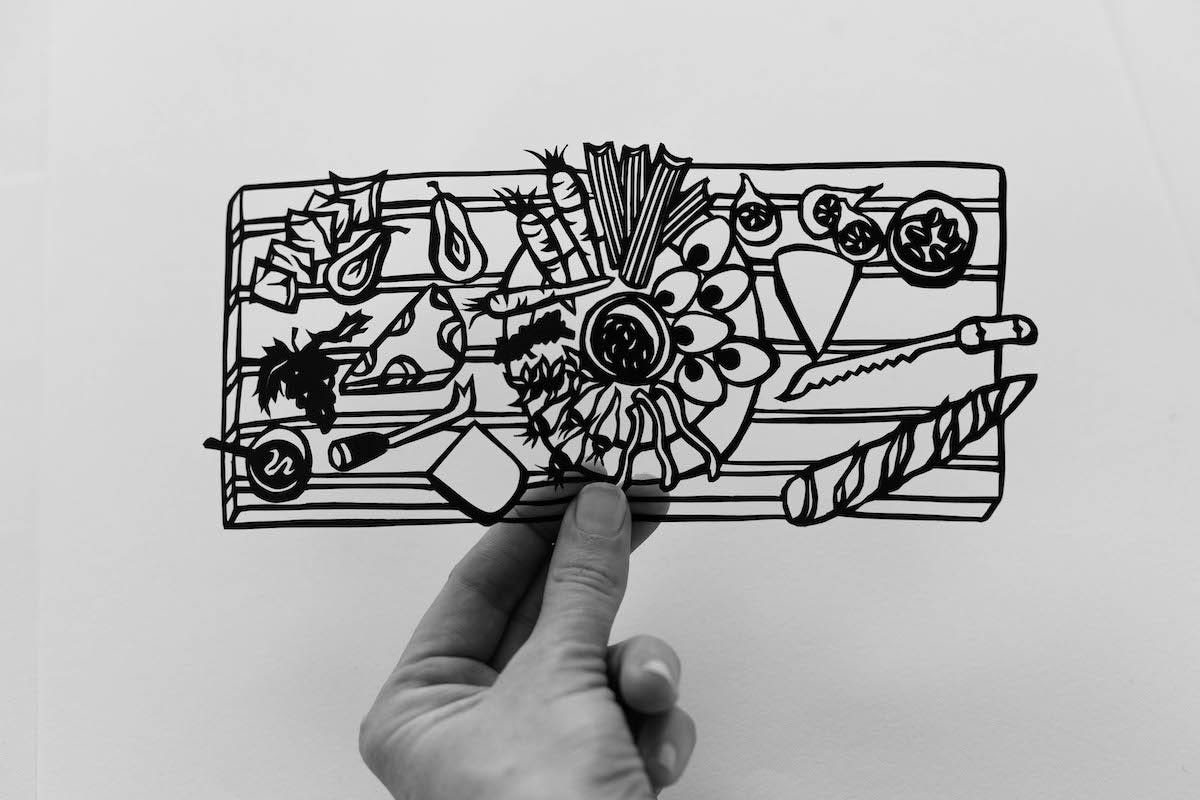Cooking Burnout
Passion, professionalization, and a (return to) love of food.
A couple of weekends ago, my friend Polina Chesnakova invited us over for a meal. It was a Sunday, and she made a beautiful green borsch. Over a sprawling lunch we talked about all kinds of things. Good food and conversation is always the way to my heart.
Polina and I have both written cookbooks (she’s very good at cake), and she’s currently at work on another one, which means that food and food-related books are always top of mind. At some point, she mentioned a new cookbook that was out and asked if I knew about it. The name of the author sounded vaguely familiar, but honestly, I had no idea.
“I’m so out of that world now, I have no clue what’s current,” I said to her.
“Yeah,” she said, “because it’s not your job anymore.”
There was in fact a time when food was a large portion of my job. This month marks the 9-year anniversary of the release of my cookbook Fika: The Art of the Swedish Coffee Break. It was the first big book that I published, the result of a hard copy proposal landing in the slush pile, where the right person (hi Kaitlin!) found it.
It’s funny to sift through the assorted threads of your professional career—like opening a time capsule of an entirely different person. For many years I wrote a column called “Foodie Underground,” a name which is so 2000s that I am almost too embarrassed to write it here. I penned a fermentation column for Paste Magazine for a bit, and I wrote about coffee quite a lot. In 2016, I started a self-published zine called Comestible, dedicated to food and featuring a variety of contributors—a little foray into bringing something tangible into the world and also a way to experiment with more visual work. That led to making papercuts for the latest edition of Joy of Cooking.
Food was fun. I loved cooking, I loved reading about food, I loved talking about food. It felt creative, it felt like it had potential. It served as an excellent lens into all kinds of other things: history, politics, culture. There was a spark, an excitement, an energy.
And then eventually, it all dissipated. I tanked, lost enthusiasm. I was meant to publish a new edition of Comestible in spring of 2020, and I pushed it back, then pushed it back again, then decided to drop it entirely. Needing something creative as a grounding point during those early pandemic days, my friend Emily and I went about making a collection of free, downloadable zines with simple recipes, called Quaran(Tiny) Guide.
It turns out that it was my last food hurrah. Slowly but surely, all of my professional and personal food focus dwindled. In that time when everyone else was geeking out on sourdough, when elaborate meals felt like a compelling use of time, I felt nothing. No pull to make food, no excitement for the potential of a good meal. I had no interest in looking at recipes. I just felt exhausted. Depleted. Flat. The “joylessness of cooking” or “culinary anhedonia” as Helen Rosner so eloquently called it back then.
Like with other ebbs and flows in our interests, there wasn’t a singular reason that food fell to the wayside. It was the result of a few things coming together at once—pandemic and personal family tragedy were the main contenders—but I also think it had to do with a touch of burnout caused by the professionalization of something I used to do just for fun.
I had spent several years feeling that if I made something interesting, I should jot down the rough recipe, in case I should make it again and share it somewhere. It was hard to make a meal without taking pictures of it. I wasn’t a chef, or a full-time recipe developer, but I still viewed food through a professional lens. “Recipe development ingredients” is still a category in my Quickbooks.

That joylessness dragged on for far longer than I anticipated. It’s only now that I finally feel that I am shaking it off.
While at Polina’s house, I perused through the pages of Anna Jones’ cookbook One: Pot, Pan, Planet: A Greener Way to Cook for You and Your Family: A Cookbook. There were several enticing recipes, and while I have a couple of Jones’ cookbooks on my cookbook shelf (ahem: it’s an entire bookcase), I didn’t have this one. It had been quite some time since I had felt a creative spark around food, and if I felt it, then I figured that I should probably should act on it. I promptly ordered the book from my local library.
The book arrived a few days later, and my husband and I picked out some recipes that seemed fun. An entire Sunday went to nothing more than reading and making a good meal. Pretty much the definition of not working.
“I think I might be excited about cooking again,” I told him, as I mixed together green peas and preserved lemons for a very elaborate looking phyllo dough tart, pondering what exactly a four year-long hiatus from my love of food said about me (nothing? everything?).
In creative careers where you work for yourself—the paths where “passion” is a driver—it’s so easy that the things you love, and that you are excited about, lose their luster.
“Find a job you enjoy doing, and you will never have to work a day in your life,” goes the classic adage, which the internet somehow attributes to both Mark Twain and Confucius. Enough people have poked holes in this sentiment—we know it’s wrong. We’re happy to flag it as a falsehood, and yet, despite our better judgement, we continue to be enraptured by its allure.
When a new and exciting creative project got finalized recently, I found myself telling a friend what a luxury it was to think about working on something that would be compensated in a way that would allow me to do the scope of work that I really wanted to do. Then I checked myself: what is luxurious about being compensated for work? Is it luxurious simply because the project is something that you want to do, something that you’re excited about? Does this mean that you shouldn’t be properly compensated when you’re working on something that you enjoy?
If you’ve worked on a long-term creative project, if you have a career in something that other people would deem “fun,” then you know perfectly well that there are plenty of ups and downs. Plenty of fun, but also, plenty of drudgery. Plenty of questioning. Plenty of existential crisis. Plenty of feeling like you don’t know what you’re doing. Passion as a profession—as many of us know—is not always fun, not always enjoyable.
Yet we continually push this narrative of passion over everything else. That comes at a cost, as pointed out in this interview on Culture Study with Dr. Erin A. Cech about her book The Trouble with Passion: How Searching for Fulfillment at Work Fosters Inequality.
“What does it mean to center paid employment in one’s self-reflexive project? How does it perpetuate a culture of overwork and close off other meaning-making opportunities? And in what ways might the popularity of the passion principle perpetuate exploitation – not only of workers’ time, effort, and emotional labor, but of workers’ very senses of self?”
It has been a very long time since I worked in an organized setting for someone else, but if you work for yourself, you also see this play out every single day. You have to be mindful of creating containers and boundaries so that the things you love don’t become completely devoid of pleasure, so that your entire sense of self isn’t wrapped up in your work. “I need hobbies that aren’t work-related,” I wrote in my notebook a few weeks ago, followed by one word in all caps: YIKES. I think this is far more telling than a hiatus from cooking.
What happens when we can’t come to the things that we love to do because we’ve pushed them to the extreme? Because we focused on seriousness over play and curiosity? Sarah Menkedick wrote in her recent newsletter about the tendency to “professionalize” children’s interests.
“Oh, you’re curious about that seed? Let’s read 47 books about it! Let’s listen to a podcast! Let’s create your own raised bed! Let’s study the science of composting and start a worm farm!”
We do this to adults as well. Our version goes something like this:
Oh, you’re curious about painting? What if you sold your stuff? Let’s create a whole art business plan so you can spend your days creating! What a joy to make art for a living! Be your own boss! The dream!
I am not saying that making art, or writing, or having some kind of other creative pursuit for a living doesn’t on occasion elicit a sense of “fuck yeah, I get paid to do this.” But it’s just as likely to elicit a sense of “this is the worst” or “it would be really nice to have better healthcare” or “what am I doing, should I jump ship and do something else entirely?”
Not to mention how much of your self-worth starts to be wrapped up in what you create and how, or how not, someone resonates with it. Which is exactly why when Kenshō studio told me recently that she started holding her hand up against the computer screen when she logged into her Substack account in order to not see any of the stats and subscriber numbers, I started doing the same. The writing part is fun, the professionalization part is less so.
I don’t necessarily have any answers for those of us with careers doing, and therefore monetizing, the things that we enjoy. Although, Carolyn Yoo actually has a whole zine for whether or not your hobby should be monetized.
We seem to have a culture that’s constantly on the pursuit of that elusive “balance,” but maybe it’s more realistic to accept that we’re on a pendulum that constantly swings back and forth. You can’t stop that movement, but maybe it’s possible to figure out ways to hold on in a more comfortable manner.

As I feel the love of food percolating again, I am reminded of how much I enjoy the color and form that’s found in what we eat and drink. Food is textural and tangible, it usually holds a good story. It’s luscious, inspiring, pleasurable. It can be enjoyed in solitude and in community.
Cooking has always felt like a creative act to me, a way to work with my hands, and figure out a way to use scraggly ingredients left in the fridge.
After what feels like a long time away, I’m happy to have it back again.
-Anna
ps: yes of course I want to hear all about your favorite recipes, cookbooks, and other food-related interests and endeavors in the comments!
Support
Do you like receiving Creative Fuel? Become a paid subscriber and help bring this newsletter to life. Your support keeps the lights on and the coffee flowing! 10% of paid subscriptions this month are being donated to RISE St. James.
Upcoming Workshops + Events
Next Create+Engage workshop is May 8, 2024, 5-6:30pm PT. We’ll be announcing speakers soon, but you can register now and get it on your calendar. Full schedule is here. All of this programming is free, made possible by paid subscribers and other supporters. Thank you!
I’m teaching an in-person papercutting workshop at Nordiska in Poulsbo, WA on Saturday May 4th if anyone is interested. Tickets+info.

With all this talk about food, I figured I should share with you some favorite food newsletters and writers. I know we’re all inundated with beautiful things to read, but these are some of the ones that I open and read on a regular basis: The Department of Salad: Official Bulletin, Alicia Kennedy, Wordloaf, Pizza Every Friday (and yes, Friday night is pizza night in my household!), and Risotto Tuesday. And be sure to check out Elissa Altman’s breakfast conversations.
Some favorite artists and illustrators who often dabble in food: Jessie Kanelos Weiner, Molly Reeder , Lindsay Gardner, Monika Forsberg, Anastasia Inciardi, and the totally out there and very creative work of Gab Bois.
Do you enjoy Creative Fuel? You can support this work by becoming a paid subscriber. You can also order something in my shop, attend one of my workshops or retreats, or buy one of my books. Or simply share this newsletter with a friend!







thank you for putting this so eloquently into words! i know you wrote it for everyone but it feels like it was written *to* me 😆. it is terrifying to lose (even if hopefully temporarily) the drive to do the things you once loved and which have defined you for a lifetime. i also am in a (again hopefully temporary) far from my culinary self, and i also am an artist who is grateful to make money with their work but is suffering something of a just burnt-out-by-life-and-the-obligation-to-make-and-present season.
Thanks Anna, this piece brightened my Friday afternoon :) This reflexion/discussion about creative hobbies becoming work is so so important and it's a good reminder to always look for the «fun» part in my writing, even if I'm paid or not. Don't loose the important part <3